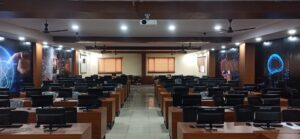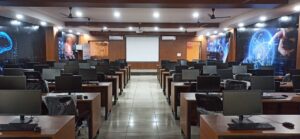M.Tech | Computer Science & Engineering
M.Tech. in Computer Science Engineering imparts a deeper understanding of composite computer science concepts, specialized knowledge in certain domains, and hands-on experience with leading-edge technologies. This degree, equips the students with skills and competencies which are vital to tackle complex problems in industries ranging from data science to software development and artificial intelligence and cyber security.
Moreover, the career options after M.Tech. in CSE, lie in higher-level positions and lead to high-paying salaries. Additionally, the degree offers opportunities for research, collaboration with experts in the area, and exposure to the latest advancements.
The faculty has a strong sense of responsibility and expertise to provide the finest possible education for industry and research. The department is pillared by competent faculty to teach specialized courses and elective courses. The faculty is progressively engaged in research and publications and has recognized projects to their credit in collaborations with industry, universities and research labs of high repute.
Our students are actively engaged in application-based projects and research projects with industry, R&D labs and research centers. The program offers the opportunity for the overall development of the students via internships; industry co-teaching, certificate programs, workshops and project based teaching-learning pedagogy.
The training doesn’t stop here; students are groomed on personality aspect as well, throughout their program duration till their placement.
The infrastructure and faculty ensure a smooth and effectual progression from students to engineers. The Department of Computer Science and Engineering has state-of-the-art infrastructure to support and complement our progressive and comprehensive degree course. We have well-equipped labs with latest generation of computer systems with high-end processors, HDD, Hi-speed internet and latest versions of software’s.


VISION
To be in the pioneer of Computer science & Engineering to create innovative engineers with moral values in a myriad of application areas in industry & research
MISSION
1. To groom the students with the quality of technical skill, who will be able to create, share and apply their knowledge in multidisciplinary areas for the benefit of society.
2. To expertise the students in advanced technology thereby promoting research.
3. To pursue excellence in Industry Institute Interaction program for students to get acquainted with corporate culture.
4. Students to get acquainted with corporate culture.
5. To impart moral, ethical values and interpersonal skills to the students.
 The Department of Computer Science and Engineering welcomes you to be a part of the thriving computer science community and become visionaries and change makers of the future. The Department of CSE started its journey of UG program B.Tech (CSE) in the year 2009 with an intake of 60 and PG program M.Tech (CSE) in the year 2012 initially with an intake of 18, in year 2021 B.Tech (AI&ML) launched with 30 Seats. The Department goal is to provide students with a balance of intellectual and practical experiences that enable them to serve a variety of societal needs. Department takes the initiative to improve the soft skills, analytical capabilities and verbal communication of the students so that they can face the competition in the corporate world confidently. To meet the objectives, department pays special emphasis on teaching and hands on practical work. Students exhibit their innovative ideas, skills and potentials as final year projects and have won many awards at University level. Faculty also teach the students to work in teams, share their ideas, present, improve communication skills and join creative teams that make a positive difference.
The Department of Computer Science and Engineering welcomes you to be a part of the thriving computer science community and become visionaries and change makers of the future. The Department of CSE started its journey of UG program B.Tech (CSE) in the year 2009 with an intake of 60 and PG program M.Tech (CSE) in the year 2012 initially with an intake of 18, in year 2021 B.Tech (AI&ML) launched with 30 Seats. The Department goal is to provide students with a balance of intellectual and practical experiences that enable them to serve a variety of societal needs. Department takes the initiative to improve the soft skills, analytical capabilities and verbal communication of the students so that they can face the competition in the corporate world confidently. To meet the objectives, department pays special emphasis on teaching and hands on practical work. Students exhibit their innovative ideas, skills and potentials as final year projects and have won many awards at University level. Faculty also teach the students to work in teams, share their ideas, present, improve communication skills and join creative teams that make a positive difference.
You are welcome in the department as a prospective student.
For further details, please contact:
Contact Info
With Best Wishes,
Prof. M.K. Chaudhary
Head – Department CSE, AI & ML
JB Institute of Technology
Dehradun
Mail: hod.cse@jbitdoon.edu.in
Mobile : +91-7895956363
M.Tech- Syllabus-View
Program Specific Outcomes and Program Educational Objectives
 An ability to independently carry out research /investigation and development work to solve practical problems
An ability to independently carry out research /investigation and development work to solve practical problems
 An ability to write and present a substantial technical report/document
An ability to write and present a substantial technical report/document
 Students should be able to demonstrate a degree of mastery over the area as per the specialization of the program. The mastery should be at a level higher than the requirements in the appropriate bachelor program
Students should be able to demonstrate a degree of mastery over the area as per the specialization of the program. The mastery should be at a level higher than the requirements in the appropriate bachelor program
 Students will be able to apply fundamental knowledge of theoretical computer science and analyze problems to provide computer based solution for engineering application.
Students will be able to apply fundamental knowledge of theoretical computer science and analyze problems to provide computer based solution for engineering application.
 Students will be able to design cost effective hardware/software system and components for engineering/social application using knowledge of hardware of software architecture, programming and development.
Students will be able to design cost effective hardware/software system and components for engineering/social application using knowledge of hardware of software architecture, programming and development.
 Students will be able to apply appropriate technology to find solution for complex problems.
Students will be able to apply appropriate technology to find solution for complex problems.
 To produce Masters in computer Science & Engineering with strong foundation of knowledge and skills.
To produce Masters in computer Science & Engineering with strong foundation of knowledge and skills.
 To produce Masters in computer Science & Engineering having capability to establish as entrepreneur, work in R&D, or pursue higher education.
To produce Masters in computer Science & Engineering having capability to establish as entrepreneur, work in R&D, or pursue higher education.
 To produce Masters in computer Science & Engineering with commitment to values and ethics.
To produce Masters in computer Science & Engineering with commitment to values and ethics.
| S.NO | Subject Name | Subject Code | Course Outcome |
|---|---|---|---|
| 1. | High Performance Scientific Computing | CST-311 | CO1 Solve the challenges of High Speed Networks and its related performance. CO2 Communicate effectively the principles used in High Performance computing. CO3 Explain the basics of high speed networking technologies and to demonstrate the knowledge of network planning and optimization. CO4 Describe the key components and technologies involved in building the state of art network design applications, concepts to optimize performance of high-speed networks. CO5 Design and configure networks to support a specified set of applications. |
| 2. | Soft Computing | CST-312 | CO1 Identify and describe soft computing techniques and their roles in building intelligent machines. CO2 Apply fuzzy logic and reasoning to handle uncertainty and solve various engineering problems. CO3 Apply genetic algorithms to combinatorial optimization problems. CO4 Evaluate and compare solutions by various soft computing approaches for a given problem. CO5 Use various tools to solve soft computing problems |
| 3. | Cyber Security | CST-316 | CO1 Critique and assess the strengths and weaknesses of general cyber security models, including the CIA triad. CO2 Appraise the interrelationships among elements that comprise a modern security system, including hardware, software, policies, and people. CO3 Assess how all domains of security interact to achieve effective system-wide security at the enterprise level. CO4 Compare the interrelationships among security roles and responsibilities in a modern information-driven enterprise—to include interrelationships across security domains (IT, physical, classification, personnel, and so on). CO5 Assess the role of strategy and policy in determining the success of information security. |
| 4. | Software Engineering | CST-322 | CO1 Explain various software characteristics and analyze different software Development Models CO2 Demonstrate the contents of a SRS and apply basic software quality assurance practices to ensure that design, development meet or exceed applicable standards. CO3 Compare and contrast various methods for software design CO4 Formulate testing strategy for software systems, employ techniques such as unit testing, Test driven development and functional testing. CO5 Manage software development process independently as well as in teams and make use of Various software management tools for development, maintenance and analysis. |
| 5. | Cloud Computing | CST-317 | CO1 Identify the architecture and infrastructure of cloud computing, including SaaS, PaaS,IaaS, public cloud, private cloud, hybrid cloud. CO2 Describe the core issues of cloud computing such as security, privacy, and Interoperability to choose the appropriate technologies, algorithms, and approaches for the identified problems. CO3 Analyze various cloud computing solutions and Evaluate cloud Storage systems and Cloud security, the risks involved, its impact. CO4 Apply knowledge for solving real life cloud computing problem scenario and illustrate solutions. CO5 Develop appropriate cloud computing solutions and recommendations according to the applications used. |
 1.Advance Data Structure & Algorithm Lab-The course on Advanced Data Structures and Algorithms is to provide the concepts on advanced data structures and algorithms used in practical life. The associated lab course is to implement all these data structures and algorithm using any programming language, preferably one among C/C++, Python, JavaThis course is concerned with the design and analysis of efficient algorithms, focusing principally on algorithms for combinatorial optimization problems. A key element of the course is the role of data structures in algorithm design and the use of amortized complexity analysis to determine how data structures affect performance. The course is organized around a set of core problems and algorithms, including classical network optimization algorithms, as well as newer and more efficient algorithms
1.Advance Data Structure & Algorithm Lab-The course on Advanced Data Structures and Algorithms is to provide the concepts on advanced data structures and algorithms used in practical life. The associated lab course is to implement all these data structures and algorithm using any programming language, preferably one among C/C++, Python, JavaThis course is concerned with the design and analysis of efficient algorithms, focusing principally on algorithms for combinatorial optimization problems. A key element of the course is the role of data structures in algorithm design and the use of amortized complexity analysis to determine how data structures affect performance. The course is organized around a set of core problems and algorithms, including classical network optimization algorithms, as well as newer and more efficient algorithms
 2.Open Source Software Technologies Lab- Open source software (OSS) is software that is distributed with its source code, making it available for use, modification, and distribution with its original rights.Carry out Research and Development in the areas of Open Source Technologies, with a specific focus on the Banking and Financial Sector
2.Open Source Software Technologies Lab- Open source software (OSS) is software that is distributed with its source code, making it available for use, modification, and distribution with its original rights.Carry out Research and Development in the areas of Open Source Technologies, with a specific focus on the Banking and Financial Sector
Enable Indian banks to try out OSS and engage with OSS to see its benefits through a state-of-the-art test bed
Foster an ecosystem of OSS vendors/developers, who are competent in banking technology
Offer training on Open Source Technologies
